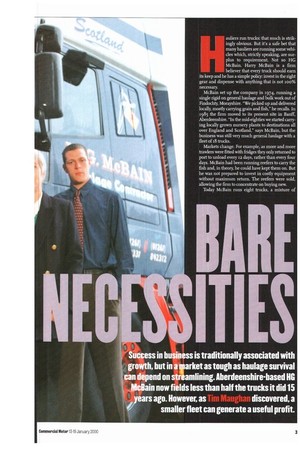auliers nur trucks: that much is strikingly obvious. But its
Page 37

Page 38

If you've noticed an error in this article please click here to report it so we can fix it.
a safe bet that many hauliers are running some vehicies which, strictly speaking, are surplus to requirement. Not so HG McBain. Harry McBain is a firm believer that every truck should earn its keep and he has a simple policy: invest in the right gear and dispense with anything that is not r00% necessary McBain set up the company in 1974, running a single rigid on general haulage and bulk work out of Findochty, Morayshire. We picked up and delivered locally, mostly carrying grain and fish," he recalls. In 1985 the finn moved to its present site in Banff-, Aberdeenshire. in the mid-eighties we started carrying locally grown nursery plants to destinations all over England and Scotland," says McBain, but the business was still very much general haulage with a fleet of i8 trucks_ Markets change. For example, as more and more trawlers were fitted with fridges they only returned to port to unload every 12 days, rather than every four days. McBain had been running reefers to carry the fish and, in theory, he could have kept them on. But he was not prepared to invest in costly equipment without maximum return. The reefers were sold, allowing the firm to concentrate on buying new.
Today McBain runs eight trucks, a mixture of
D Ivecos and Dais, and the trailer fleet is carefully tailored to demand. In the 1980S it was a mixture of reefers, bulk trailers, and flatbeds; nowadays all 16 of McBain's semis are curtainsiders. Some 90% of the company's business is derived from a paper factory which is 40 miles from the firm's Banff base, and curtainsiders are ideal for this work.
Business partner
Harry's wife, Norma, is also his business partner; their sons Alan and Graham look after the admin. Norma says: "We don't have a written contract with the paper manufacturer but we speak to them every day. We've been working with them for nine years."
Harry adds: "The other io% of work is carrying potatoes. We collect from Aberdeenshire and Morayshire, then take them to food manufacturers in England." The curtainsiders can handle just about any pre-packed consignment. Paper is in reels; the potatoes are palletised. And then there is backloading. "We always backload," says Harry. "But we carry for the same customers, and we are wary of clearing houses." Norma explains. "The rates are too low, although we do use them occasionally to ensure a frill load."
True to form, HG McBain only invests money and time where a profit can be made. Two Haulmajor shunters are permanently stationed at the paper factory, where they are operated by a team of four—there at least one driver is on duty 2.4 hours a day.
Shunters pick up trailers from the factory yard, take them to the loading bay and then to the HGVs for delivery. McBain says the shunters load in the region of 65o trailers a month; this figure includes his own trucks as well as those operated by other hauliers.
The work with paper and potatoes is bread and butter for the McBains, and it means that diversification is not on the agenda. Norma says: "We have tried tippers but we got out of it." They were a liability, according to Harry: "We used to get a lot of work, then it would go quiet. It was not steady enough." As a result the McBains are not interested in changing their fleet. Six of the tractors are Ivecos, and they always buy new. "When we bought Ivecos in the late 1970s there were not many on the road," says Norma. "We were impressed by the service and we have been with them ever since." The Ivecos are supplied by Arnold Clark Truck and Van of Bogsburn, Aberdeen.
Remote location
The McBain policy of buying new makes sense in its remote location. Because there is little to go wrong with new trucks, McBain's fitters can concentrate on the trailers and the shunters. This is also a useful source of income because 70% of their work is carried out on other firm's vehicles, including hauliers and own account operators.
The policy of repairing other hauliers' trucks makes good business sense, but how do the McBains see the wider picture? For Harry, sound business stems from the ability of customer and haulier to communicate—no problems are insoluble. "We can sort it out between ourselves," he says.




















































































































